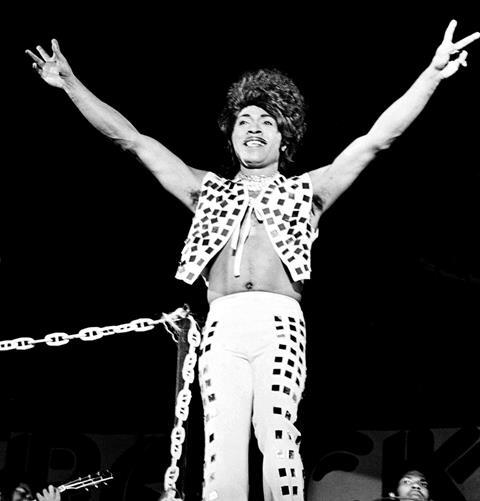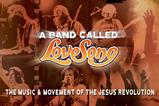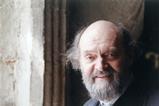Credited with being the original father of rock and roll, Little Richard careened between religion, sex, drugs and music. Derek Walker reviews I Am Everything, the documentary which charts his complicated life and sexuality

“A-wop-bop-a-loo-bop, a-lop-bam-boom!”
If you want to know where rock and roll started, it’s in those words.
This was the genre’s Big Bang. This – the inspiration for huge, history-making artists like The Beatles and the Rolling Stones – was Little Richard.
When he died in 2020, people started noticing how little credit his impact had been given. Director Lisa Cortés was one. In the trailer for I Am Everything, which premièred at this year’s Sundance Festival, she says her work: “explodes the white-washed history of rock and roll and shines a light on the originator.”
Contradictions
When Richard Wayne Penniman was born, everything was against him. He was poor, the third of twelve children; black in a segregated society; physically disabled, with one leg slightly longer than the other; and gay (for which his father “hated” him). Even his name was an error – it was supposed to have been Ricardo.
Asked how he’d like to be remembered, Richard answered: “As a child of the King of Kings, the Lord of Lords”
Cortés commented: “His life was so full of contradictions: he was gay, he was straight, he was a preacher, he was a drug addict.” But Richard had no clear role model. His father was a church deacon and brick mason, but also sold bootlegged moonshine on the side and owned a nightclub.
Despite all the obstacles, Little Richard was vivacious and loud as he grew up and, in most footage of him throughout his career, he comes across as gregarious and fun.
A hard start
But life was hard. When his father kicked him out of the house for being gay, he joined a succession of travelling shows, finding community in performing with other outcasts, often as a drag artist.
He had tried for a recording contract for over four years, with the only success being a single that his father was proud to play in his nightclub. Richard was in the middle of another doomed recording session when they decamped to a nearby bar for a break.
That’s when Richard saw a piano and hollered: “A-wop-bop-a-loo-bop-a-good-God-damn!”
His producer, Bumps Blackwell later noted: “And those were the cleanest words of it”.
But it had such obvious hit potential that Blackwell had songwriter Dorothy LaBostrie clean up the words. And the rest, as they say, is history.
Making music
At the time, radio was segregated, but white teenagers had cars and transistor radios, so his music reached them. However, white radio stations and record companies didn’t want their kids admiring a black artist, so had Pat Boone and Elvis Presley re-record his music. Both sold in the millions, earning massively more than Little Richard.
When Richard was featured in the film The Girl Can’t Help It, he suddenly reached an international audience. On a subsequent trip to Australia, he saw the heat of the engines, thought the plane was on fire and that angels were carrying the plane.
Then, on stage, he apparently saw the Russian satellite, Sputnik, passing overhead and thought it was a fireball warning him about God’s coming judgement.
To God, and back again
As a result, he quit music, enlisting at a conservative Black theological college, where he offered to buy his records back so he could burn them. Now wearing a suit and tie, he recorded a gospel album and married Ernestine Campbell in a short-lived match.
His life was so full of contradictions: he was gay, he was straight, he was a preacher, he was a drug addict
In 1962, he was booked to play the Liverpool Empire, told that it was a gospel concert. But, in reality, it was a rock show, where his support act were the then little-known Beatles. It reignited his rock and roll career. Ironically, the people he inspired (the Rolling Stones also supported him on tour) eventually gained far more fame than him. With the ‘British invasion’ of these acts in America in the 60s, a new era was beginning.
Richard began to dress more flamboyantly and do everything to excess – including sex and drugs. But when his brother died of a heart attack in the same year that two friends were murdered, he gave up the music and returned to God.
Searching for recognition
In the 80s, when presenting a Grammy award for best new artist, he reminded everyone that he hadn’t yet won one himself. He was constantly hurt that his contribution to rock and roll wasn’t appreciated. When he won his lifetime achievement award in 1997, he was in tears. Recognition had finally arrived.
Cortés’ film has more gay commentary, and accentuates Richard’s lack of recognition more than the recent, slightly sharper BBC biopic The King and Queen of Rock and Roll. But, unlike the latter, it does cover his marriage.
At the end, you still wonder whether he had fully come to terms with himself.
Asked by journalist Danny Smith how he’d like to be remembered, Richard answered: “As a child of the King of Kings, the Lord of Lords…”
He goes on in a similar vein for a couple more paragraphs, before finally adding: “I just want everyone to go out and buy my book…”
I Am Everything is in UK cinemas now. The King and Queen of Rock and Roll is available on BBC iPlayer






































No comments yet